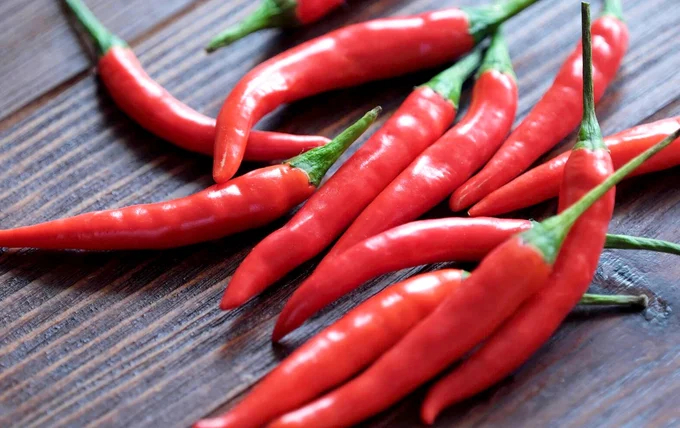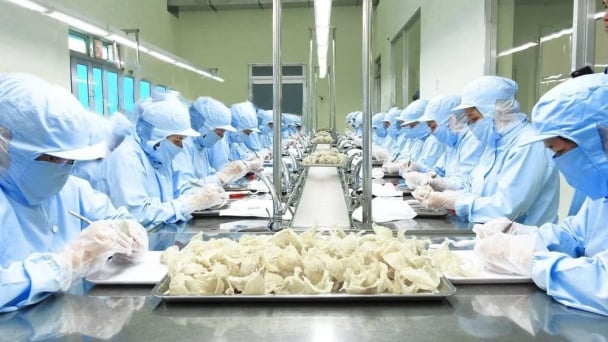May 16, 2025 | 10:32 GMT +7
May 16, 2025 | 10:32 GMT +7
Hotline: 0913.378.918
May 16, 2025 | 10:32 GMT +7
Hotline: 0913.378.918

Korea continues to inspect imported Vietnamese chilli.
According to the Vietnam Trade Office in Korea, the Trade Office received a letter from the Korean Ministry of Food and Drug Safety (MFDS) noticing of re-designation of imported foods that must be inspected upon entering Korea.
Accordingly, in order to raise awareness of importers' food safety responsibilities and ensure safety for consumers of imported food, MFDS Korea announced that it will extend the inspection order under Article 22 (Order to conduct inspection) of the "Special Act on Imported Food Safety Control" and according to “Regulations on Inspection Orders for Imported Food”…
Before terminating the inspection order, MFDS decided to re-designate certain food items for inspection after much consideration and review them due to a high rate of nonconformity or a risk of harm.
For products imported from Vietnam, the food item that needs to be checked is hot peppers (Cayenne, Capsicum, Chili Pepper, Red Pepper, Tabasco). Test Categories are: 7 pesticides (Diniconazole, Tolfenpyrad, Tricyclazole, Permethrin, Dimethoate, Isoprothiolane, Metominostrobin).
MFDS Korea will extend the inspection order from March 31, 2023 - March 30, 2025 (instead of March 30, 2024), due to imported foods continuously failing to comply with standards and specifications. The list of food items that must be inspected is posted on the MFDS website (http://www.mfds.go.kr) according to Article 3 of “Regulations on Inspection Orders for Imported Food”…
In addition, Korean individuals or business organizations intending to import food under an inspection order must submit test reports issued by MFDS-approved laboratories when declaring imports.
The Vietnam Economic and Cultural Office in Taipei also recently announced that Taiwan will increase supervision of imported chilli and chilli products.
According to the Taiwan Food and Drug Administration (TFDA), this is one of the measures to manage imported agricultural products implemented by Taiwan this month, when TFDA inspection discovered the banned cancer-causing dye additive Sudan Red III in chilli powder provided by a company in China's Henan province. The company's chilli powder has been used by 10 food processors in Taiwan in shrimp snacks and other products.
The incident has raised a wave of concerns about food hygiene and safety management in Taiwan when imported chilli powder products containing the above additive have been used by many food businesses to make chilli powder, chilli oil, white pepper powder, curry powder, hot pot ingredients or dim sum cakes...
Products requiring enhanced import supervision include goods containing chilli fruits with HS code 0904.22.00.00.1 (English description: Fruits of the genus Capsicum or of the genus Pimenta, crushed or ground) and chilli products HS code 0904.21.90.00.3 (English description: Other fruits of the genus Capsicum or of the genus Pimenta, dried, neither crushed nor ground). The indicator that requires increased monitoring is Sudan Red.
TFDA's announcement also shows that, since the end of February until now, Taiwan has issued restrictions to stop import customs clearance inspection of chilli and chilli-based products for 21 Chinese enterprises. A Vietnamese chilli export enterprise to Taiwan, a Thai enterprise and a Mexican enterprise are also subject to the above restriction.
According to the General Department of Customs, in 2023, Vietnamese chilli exports will reach $ 72 million, an increase of 34.5% compared to 2022. In the group of exported vegetables, chilli is the most important item, accounting for 25.9% in value, far surpassing other items in the same group such as sweet potatoes, and cauliflower...
Translated by Hoang Duy

(VAN) Japan's efforts to lower the price of rice through the release of its stockpile may finally be making some progress, albeit at a snail's pace.

(VAN) U.S. tariffs are not only a 'shock', but also an opportunity for Vietnamese businesses to renew their mindset toward comprehensive development.

(VAN) As Bac Giang lychee enters the harvest season, Minister Do Duc Duy expects that the fruit will contribute greatly to agricultural exports due to standardized production and deep processing.

(VAN) Consumers have shown a preference for free-range eggs, but those farming systems are more vulnerable to biosecurity risks like bird flu.
/2025/05/09/5701-1-184335_301.jpg)
(VAN) Vietnam’s eel exports nearly doubled thanks to a mud-free farming model, opening up new prospects while still facing numerous barriers related to international standards.

(VAN) Minister Do Duc Duy warned that if production is not professionalized and supply chains are not transparent, the U.S. market could become a growth bottleneck.

(VAN) Delegating surveillance responsibilities to local authorities is a cost-saving and efficiency-boosting measure that removes a key bottleneck for enterprises, according to Director General Duong Tat Thang.